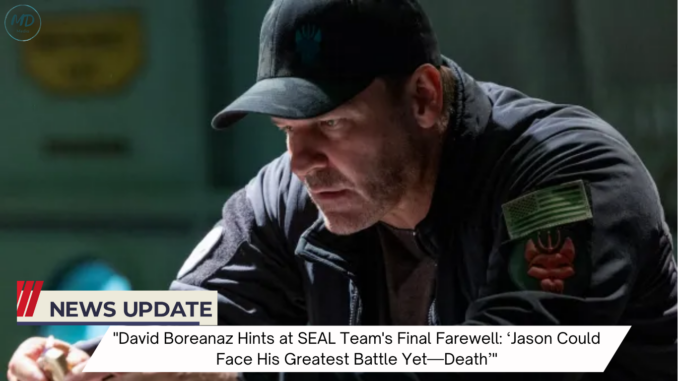
Bravo’s last easy days begin this Sunday, August 11, when SEAL Team premieres its 10-episode farewell series on Paramount+.
Season 6 ended with Bravo’s fate uncertain, with an impressive but certainly damning display of unity. Captain Jason Hayes revealed—at his Navy Seal ceremony, no less—his TBI and critical condition during recent missions, after which he was called in by his superiors. “You made a terrible mess and left us no choice but to fire you,” Blackburn declared.
But Ray interrupted and went on to reveal that he’d been suffering from PTS since the kidnapping, after which everyone else entered the room—Sonny, Brock, Trent, Omar, and two dozen other operators, each recounting what had weakened them.
When Season 7 premieres on Sunday, viewers will see the various ways Bravo wasn’t literally “punished” but… was still punished, for being such a publically shamed commander.
spoke with the show’s showrunner and executive producer, David Boreanaz, about the state of Bravo Team and what it will take to get them back in the fight.
Where will we find Bravo when the season opens, and what exactly is Jason doing?
For me, it’s a full-circle journey. Going into the season, even before the writers’ strike, I had decided that this was my endgame — which is something that not many people know about.

We see Jason in a place where he’s completely resolved, coming full circle, while also looking at what these special operators are going through. He’s kind of comfortable, reserved, waiting on the sidelines, thinking he’s got it all together—with his family life and the life of the team. But then we see that it’s not, and that being an executive, that kind of character, may not end well for him. That’s something that I’ve discussed and wanted in a lot of ways, and I’m happy to let that happen.
We see Jason spending time in the premiere with Mikey, Emma, and her boyfriend…. Would you say that helps him envision a different, non-Bravo future for himself?
I would say it makes him see a future that he probably still feels a little awkward about. Because what he thinks is working may not be working. [Laughs] The ultimate attraction for these operators is, “How do they handle their murders?” How does that impact them traumatically both on the job and at home? So having him at home for the first couple of episodes, that’s going to be traumatic, and that’s something he’s going to have to lean into, to sort of deal with that and let it go and heal himself. But ultimately, he could be taken away by the greatest force of all, which is death. That’s something we have to keep on the table and want to keep on the table. How he gets back on the battlefield and what happens to him is going to be interesting, I mean, Bravo’s in a pretty tough spot with DEVGRU right now. How do they get back in good enough shape to break down some doors again? Yeah, that picks up a few months after we started the story… obviously the world continues to change and evil is coming to a place where these operators are needed, especially Bravo Team. They’re going to be kicking ass in a few episodes—you’re going to see some training sessions happening as they patiently wait to be brought back, to be put back into their unit. And it’s a whole new war going on for them, and they have to adapt or else be pushed aside—so that’s going to be a big challenge for them.
In this final season, what would you say is the balance between action versus more emotional and introspective scenes?
The first half is very emotional and introductory; I think the balance comes in the second half. That doesn’t mean there’s more action in the second half than there was in the first, but we’re building toward that. In the first episode, you feel the emotion, and that builds into Episode 2, where we see the big impact of saving someone from the situation they’re in. That moment in Episode 2 takes us into the heavy beginning, then it shifts to the end—and that’s when things get crazy.